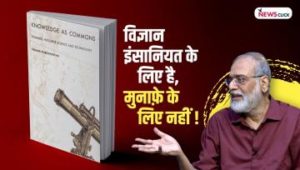The US-India Joint Statement signed during Modi’s visit to the US has opened the doors for two Indian laws that have been passed by the Indian Parliament. One is on patents – the Indian Patents Act – that contain some measures to keep drug prices low for the people, which the US and its pharmaceutical industries have been trying to change for the last decade. The second is on nuclear liability, again anathema to the US nuclear industry.
The Modi visit is also important for what he did not raise with the US government. There was no mention of the NSA spying in India, which included the BJP as well. There were six political entities in the world that the NSA spied upon officially, and one of them was the BJP. India is also one of the 33 countries that have signed a 3rd Party agreement with NSA giving it access to our telecommunications and Internet infrastructure. That means India not only allowed NSA to spy on any entity or any person in India but also provided them the physical access required for such spying. Modi not only did not utter one word of protest against such spying against his own party, but also made clear his intention to continue such relationship under Defence and Homeland Security clauses of the Joint Statement.
.jpg)
Image Courtesy: flickr.om
The Indian Patents Act was amended in 2005 to bring it in line with the TRIPS Agreement that is a part of the WTO. By signing onto TRIPS, India essentially had to abandon the provisions of the 1970 Patents Act which did not allow product patents in pharmaceuticals and food. However, the TRIPS agreement had flexibilities for which the developing countries including India had fought bitterly during the negotiations. This related to what could be left to individual countries in terms of standards of patenting and on various provisions relating to compulsory licensing.
It is now accepted worldwide that without India’s generic industry, AIDs would have wiped out much greater numbers, particularly in Africa. In spite of various efforts, the AIDs drugs available from pharma was in the range of $10,000. It was only when CIPLA announced that it would supply three AIDs drugs in less than one dollar a day – $350 a year – that the prices really crashed. However, this was possible only because these medicines were patented before 1995 and therefore not covered under the TRIPS agreement for countries such as India. Even here, the US and other developed countries fought very hard to try and keep Indian generic medicines out of other markets, buckling in only under the pressure of developing countries and progressive health groups.
Under WTO agreement India had signed in 1994, India had to introduced product patents by 2005. The question was what kind of Amendments would be introduced to make it TRIPS compliant. Under the previous NDA regime, the then Law Minister Arun Jaitley had presented a set of amendments that were very friendly to big pharma and also the proprietary software industry. Not only was its TRIPS plus in its provisions for pharma but also included software for patenting. THe UPA had introduced essentially the same Amendments to the Parliament as introduced earlier by the NDA.
Here, the Left’s position in the UPA was crucial. The UPA required Left’s votes in parliament to pass the Amendments that would make the Patents Act WTO compatible. It was under Left pressure that finally the UPA under Manmohan Singh agreed to drop software patenting and introduce flexibilities that still existed under TRIPS. Three major elements in the Indian Patents Act that the Left introduced still remains as a brake on big pharma and its hunger for super profits.
One is the Section 3D, that limits what can be patented – e.g., small tweaks, claiming a new dose to be patentable or mixing two well known drugs – were all held to be not patentable. Further, two other provisions were retained in the Patents Act – one was pre and post grant opposition by third parties and the other is compulsory licensing under which licenses can be granted to others when patents are abused or when public health needs so require.
It is a combination of pre-grant opposition and 3D provisions that finally led the Indian courts to rule that Glivec, a Novartis drug used to control leukaemia was not patentable. Big pharma and their agents in India have been howling since then of 3D not being TRIPS compatible and how it would defeat innovation in the Indian market. The US Congressmen and its various chambers of commerce have joined this rant and argued that Indian Patent Law needs to be changed to suit the interests of US business, otherwise India should be sanctioned.
The second issue on which India has fallen foul of the US business interests have been in the area of compulsory licensing. India has issued a compulsory license for a grossly over-priced Bayer cancer drug, Nexavar. The drug companies claim that the right to issue such a compulsory license is severely restricted – a claim that they are not willing to try out in court. The truth is that under TRIPS, every country has the right to compulsorily license any drug in public interest, a provision the US government also threatened during the anthrax scare in the US.
The problem for the US is that if it considers the Indian Patents Act to be not compatible with TRIPS, the right forum would be to raise it in WTO. Knowing that such an attempt would fail, the US government and companies have been employing bluff, bluster and blackmail instead.
Till now, the Indian government’s position has been that the debate on this issue is over. India cannot now change its Patent Law as it has been passed by the Indian Parliament unanimously. The change in this position took place with the Modi government taking office and was flagged off by a statement by Nirmala Sitharaman, the Commerce Minister that India needs an Intellectual Property Policy, allegedly “because India does not have any policy, developed nations are picking holes in India’s IPR laws.”
Worried by such statements, a number academicians, former diplomats, scientists, lawyers and public health organisations had written a sharp, open letter to Narendra Modi’s government, strongly cautioning against coercion from the US to align India’s IP laws with the interests of big pharma. They had asserted in their letter that it is not true that India has no policy on IP. On the contrary, India has a clear policy on Intellectual Property, geared to protect the Indian people against predatory price gouging by patent holders. Their fears have now come true. The India US Joint Statement states, “Agreeing on the need to foster innovation in a manner that promotes economic growth and job creation, the leaders committed to establish an annual high-level Intellectual Property (IP) Working Group with appropriate decision-making and technical-level meetings as part of the Trade Policy Forum.”
Intellectual Property is now pegged to innovation and not the needs of the people. And this has always been the argument of the patent holders — the people must pay for big pharma’s innovation with super profits, even if it means death to a large number of patients. The second issue is that India has now agreed to jointly examine this issue, when earlier it had rejected any discussions with the US International Trade Commission (USITC) on India’s IP issues, as it was a matter of domestic policy. Even more dangerous is that not only have we decided to discuss India’s IP policy with the US trade authorities, but also allowed them a role in decision-making, solely the preserve of the Indian government.
The second issue on which Modi has now conceded is on nuclear liability. The global nuclear suppliers claim that their nuclear plants are completely safe and yet demand to be protected against any liability in case of an accident. It is the only industry in the world that claims this “unique immunity” against any liability. The Indian Parliament rejected their demand for liability and held that if they are going to sell billion dollar reactors, they need to bear some liability. It legislated a provision in the Nuclear Liability Act that the nuclear operator could recover damages it would have paid, if the fault was traced to the supplier’s equipment. Of course, the liability is capped to only 300 million SDR’s or about Rs. 1,500 crore, a small fraction of the $ 2-3 billion price-tag that foreign reactors have. But even this small liability for supplying possibly faulty equipment is not something that a GE or a Westinghouse are willing to countenance.
The Modi government in the Joint Statement “…established a Contact Group on advancing the implementation of civil nuclear energy cooperation in order to realize early their shared goal of delivering electricity from U.S.-built nuclear power plants in India. They looked forward to advancing the dialogue to discuss all implementation issues, including but not limited to administrative issues, liability, technical issues, and licensing to facilitate the establishment of nuclear parks, including power plants with Westinghouse and GE-Hitachi technology.” In other words, the joint Contact Group will address the issue of nuclear liability as well, for helping Westinghouse and GE.
Allowing the US Trade bodies to jointly decide India’s IP and nuclear liability policy is a betrayal of the Indian people. It will not only endanger the Indian peoples’ access to life saving medicines, it will also weaken India’s position in the world as a global pharmacy of the poor. India’s Patent Act is a model on which a number of countries are looking to craft their patent laws. This will suffer a huge set-back if any dilution of the Indian Patents Act takes place.
On nuclear liability, India has created path-breaking legislation by holding nuclear suppliers liable for their defective supplies. Again, this is what Modi is willing jettison in order to cosy up to the US. The visa on arrival is now not only for the US citizens but also for all US companies. The Indian people will end up by paying a huge price for the concessions Modi has made on their behalf.



